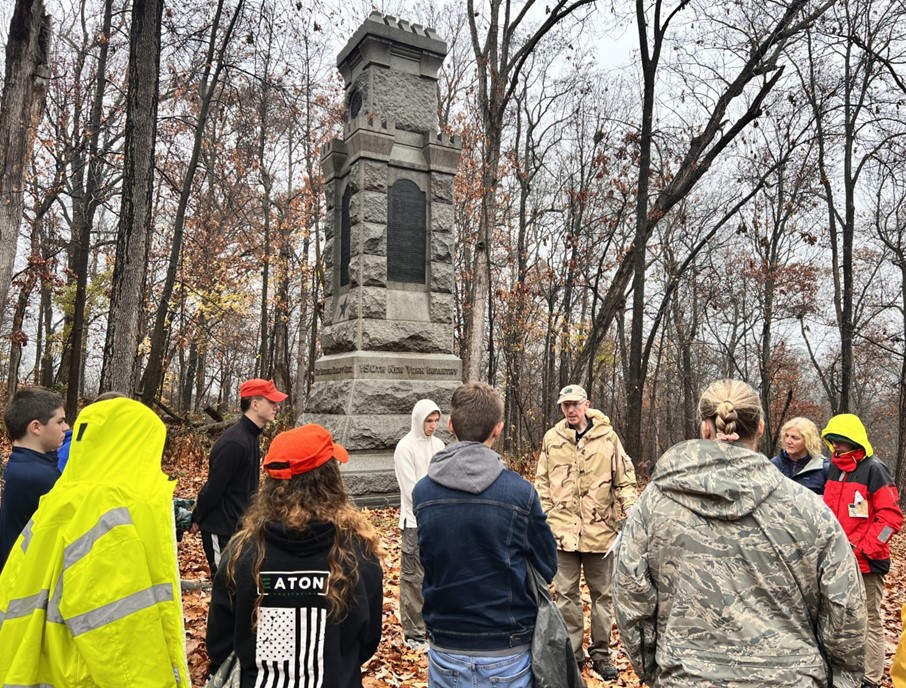Gettysburg: Historic Site Visit Drives Leadership Lessons Home

 By mid-morning nearly a half-inch of rain had fallen. The sky and forecast agreed – correctly, it turned out – that more was on the way.
By mid-morning nearly a half-inch of rain had fallen. The sky and forecast agreed – correctly, it turned out – that more was on the way.
The Civil Air Patrol members visiting Gettysburg National Military Park were soaked as they stood on Oak Ridge and Barlow Knoll and explored the Wheatfield and Culp’s Hill. Their circuit culminated by walking the path of Pickett’s Charge, from Seminary Ridge to the Angle.
Through the ground was saturated and muddy at times, it was theirs for the day – and they made the most of it, with no complaints about the conditions. The battleground served as a leadership laboratory for cadets from the Massachusetts and Vermont wings, and examining the events of July 1-3, 1863, proved relevant to the study of modern leadership.
Rather than a battlefield tour, the Gettysburg “staff ride” served as an official cadet leadership school. Participants followed a lesson plan encompassing eight hours of contact time, an instructional team, and clear learning outcomes focused around inquiry, critical thinking, and how people think, act, and learn.
Staff rides are common in the military and have been adopted by universities and public safety organizations as well for professional development. The term originated in the 19th century when military leaders rode about Civil War battlefields teaching new officers about command.
“It’s essentially case-method learning,” said Maj. Brian Silva, the Massachusetts Wing’s director of cadet programs. “While not all of the wing’s cadet leader development and educational programs are based upon historical cases, taking abstract principles into the real world stirs the imagination in ways that a classroom environment can’t hope to match.”

The participants agreed. “These discussions made me think differently about a lot of things I thought I knew,” said Cadet Maryelizabeth Methot of the Westover Composite Squadron. “It was a true learning experience.”
Lt. Col. LouAnn Maffei-Iwuc, the wing's cadet programs activity officer, echoed the sentiment, observing that adult member and cadet leaders alike got past clichés and superficial textbook answers. “We sparked some great conversation,” she said.
Silva said that this and similar Massachusetts Wing courses were part of a new and exciting encampment leader development and education strategy. The program is intended to develop cadet officers and noncommissioned officers through year-round planning, resourcing, and assessing of the encampment training and leader development effort.
As the program develops, the plan is to educate new guides from among the encampment line and support staff. Paired with an adult mentor, cadets will learn to facilitate discussions around the meaning of leadership and moral courage, the balance between control and empowerment, and strategies of critical thinking.
“What’s most important for the cadet facilitators is knowing how to ask the right questions – questions that inspire curiosity and get ideas flowing,” Maffei-Iwuc said.
The Massachusetts Wing also conducts staff rides at the historic Lexington and Concord battlefields runs Historical Decision Case seminars in which cadets work in teams to devise approaches to complex military problems from the past. Those seminars can also be conducted online, making them far more flexible and cost-effective.
After the Gettysburg venture, more than one cadet said they’d do it again even if they knew it would rain as hard.
“It was – simply stated – a phenomenal experience,” said Cadet 2nd Lt. Henry O’Brien of the Goddard Cadet Squadron.
_____
Lt. Col. Thomas Williams
Deputy Commander for Cadets
Brig. Gen. Arthur J. Pierce Composite Squadron
Massachusetts Wing


